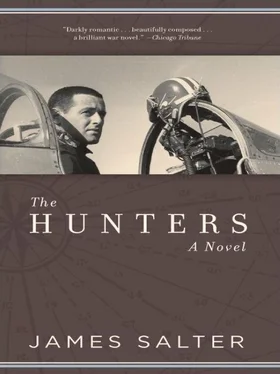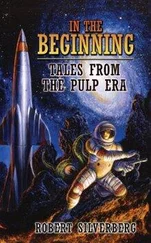Cleve listened lightly. The words went skimming across his consciousness. He could feel his palms sweating.
“…scattered cumulus,” the weather officer was saying, “with bases at about two thousand and tops five to six thousand. There may be occasional buildups higher than that late in the afternoon. At thirty-five thousand a thin deck of cirrus, nothing more than scattered. Visibility throughout the area, fifteen miles or better.”
He went on to give the winds aloft, the azimuth and elevation of the sun, the condition of the tides, temperatures of the air and water, and finally the runway in use at the time of takeoff.
“What about contrails?” Imil asked.
“I don’t think you’ll see cons today at any altitude.”
“Good,” Imil said. “Now here’s the way we’ll go in.”
He began outlining takeoff times for the flights and squadrons, then the patrol altitudes. He told which of the fighter-bomber groups were going in first, and from what direction. He warned of the many guns, heavy and light, in the target area. They were all marked on the wall behind him.
Cleve jotted notes down on his map. He and Hunter would be the last ones off. That didn’t surprise him. He could feel warm beads running heavily down his back in the hollow between the shoulders and down his calves. It was unbearably hot in the room. They had been there for at least thirty minutes.
“Boys,” Imil was saying, “I kid you not. They’ll be up there today. I wouldn’t be surprised if there were five hundred of them. And they’re going to be after those fighter-bombers down below us. Fine, I say. We’ll be waiting for them.
“You flight leaders! Be aggressive. Don’t waste your time on long shots. Get in close where you won’t miss. And element leaders. I want you covering the flight leader as long as you can. Split up when you have to and not before. You wingmen. You’ve got the toughest job of all. Keep your eyes open. Keep your leader cleared. The air is going to be loaded with ships today, so don’t be calling a break for some goddamned speck five miles behind you. Make sure that they’re MIGs and that it’s time to break. Everybody! Keep off the radio unless you’ve got something important to say. Don’t clutter up the air with long conversations. If you lose each other up there, go to another channel and work it out. Watch your fuel. Don’t stay up there until you’re down to just barely enough to make it home, because if you do and you get bounced on the way back, you’ll never get there. When you’re down to fifteen hundred pounds today, clear out. Don’t make that one last sweep. Get going right then.
“This is one time when there’ll be MIGs enough for everybody. When you see them, go after them; and when you get close, put that pipper on them and keep it there. Hold down that trigger as long as you’re hitting them. I don’t want to hear about any goddamned damages when we come back. I want to hear about kills. Nothing but kills. Remember that.” He paused. “You can take a look around you right now, because there’ll probably be some empty seats here tomorrow. Just make sure it isn’t you.
“All right. Let’s get them!”
They were all on their feet and standing in place while the colonel stepped down from the platform and made his way between them toward the door at the rear of the room. Then came a general foot-shuffling movement as the pilots followed him out, jamming up at the door and waiting until they could funnel through. Cleve stood in the midst of them, carried along by the flow. He glanced at Hunter, who smiled cheerlessly. For some reason that defied isolation, Cleve had the feeling that he had flown this mission already, once before in days long past, and was now about to do it again.
“Feeling lucky, Gabe?” Imil said. He was out in the debriefing room calling to individuals in the crowd moving past him.
Gabriel nodded unthinkingly.
“How about you, Doctor? Are you going to get them?”
“You bet,” Pell said. He held up his small fist.
“That’s the way,” Imil grinned.
He stood there, looking staunch for everybody. He was full of excitement and nervousness himself. Occasionally, he clapped his hand on a passing shoulder.
“This is the one, boy,” he would say.
He turned once, abruptly, and feinted as if to punch Moncavage in the stomach. He laughed.
“What do you say, Monk?”
“I’m ready,” Moncavage said, after having to clear his throat.
“So am I. So am I.”
The locker room was stuffy and filled with flies. It was too early to dress. Cleve had more than an hour to wait. He went outside with Hunter and sat on a bench partially shaded by one of the eaves. It was quiet there. They sat aimlessly, soundless drums beating within them.
“The last damned flight,” Hunter said. “What a place to be on a mission like this. It’ll all be over by the time we get there.”
Cleve did not reply.
“One of your last missions and all, too. I think it’s pretty rotten.”
“So do I.”
“I wish you’d said something.”
“Who to? The chaplain?”
“One of the colonels,” Hunter said. “The major. Anybody.”
Cleve laughed.
“That’s it,” he said, “the true comic touch. I’d be better off praying.”
“You oughtn’t to joke about that. I’ve prayed here more than once.”
“How’d you make out?”
“I mean it.”
“Well, I know. That’s why I asked.”
“They haven’t been answered yet,” Hunter said truthfully. “They will be, though.”
“It’s always a possibility, I guess.”
Not much later, almost unexpectedly, there was the sound of the first ships starting their engines. Cleve looked toward it. The black ramp seemed to be melting in the heat. Upon it, like mirages, stood the baking aircraft. He could see the wash of curdled air that was the jet exhaust billowing up behind the starting ships. He walked inside with Hunter and dressed slowly.
He was bathed in sweat when he carried his equipment out to the ship. The sun lay on his shoulders and back with a weight almost equal to that of the parachute. He felt thirsty. His mouth and throat were dry.
They were still working on something on his airplane. He laid his things on the left wing and walked around to the nose to see what was being done. The armament man was having some trouble. A defective magazine had become jammed in the gun camera, and he could not remove it.
“It’s stuck halfway in there,” he explained. “I can’t get it in or out either one now.”
“Let me try,” Cleve said.
He reached into the narrow opening with his own hand and tried to force the film package to move. His fingers were slippery, and in the confined space a good purchase was difficult. He could not move it either.
“It’s all right,” he said. “Leave it as it is. You can work on it when I get back.”
“Yes, sir.”
He walked around the airplane, inspecting it, and then climbed into the cockpit and began strapping himself in. This occupied him for a while. When he was finished, he looked at his watch. Still several minutes remaining. He felt he had been waiting for hours. His thirst was very strong by now, and he seemed to be sitting in a pool of searing air. Every piece of metal about him was too hot to touch. He could feel the sweat going down his legs in hesitating streams. Finally, it was time. He started his engine.
It was even hotter taxiing out, but by that time a kind of transition had been completed. He was immersed in discomfort. He no longer noticed it. It was even satisfying to be so baptized. The interior of his oxygen mask was as slippery as fish, and the air he drew from it was warm and flatulent, but at last he was fully involved in the mission and far beyond any of the trivialities that went with it.
Читать дальше












